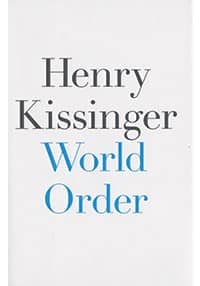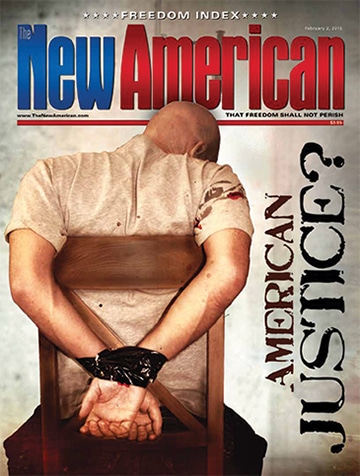Kissinger’s World Order
World Order, by Henry Kissinger, New York: Penguin Press, 2014, 420 pages, hardcover.

The godfather of the New World Order, nonagenarian diplomat Henry Kissinger, has left one important question unanswered in his latest book, World Order: What precisely is meant by the term “world order”? Kissinger’s book includes a very readable survey of attempts to conceptualize and implement “world order,” from Europe’s Peace of Westphalia in 1648 to the rise of modern Islamic theocratic government as embodied by Iran’s ayatollahs — but nowhere does the author explain exactly what “order” means. This is, no doubt, because, as Kissinger is surely aware, the word “order” in political contexts has long been synonymous with government — but invoking “world government” is bound to raise red flags for patriotic Americans (and people of other nationalities who might stumble across Kissinger’s latest tour de force).
The Good, the Bad, the Ugly
World Order is a frustrating book for various reasons, not the least of which is the author’s continual skirting of exactly what the title means. It is — somewhat unexpectedly, given the nature of the material and the worldview of its author — a gracefully written, easy-to-read tome with a significant amount of valuable information. Kissinger displays an uncommon level of erudition (and mental acuity, for a 90-year-old) in describing early America as a neutral player in international affairs, in keeping with Washington’s famous warning about avoiding “permanent alliances with any portion of the foreign world” and her vision of herself as a future world power, thanks to her liberty and her independence from dissipating foreign entanglements. As Kissinger quite properly documents, early Americans saw these policies as having the stamp of divine approval, because they discerned the hand of Providence in the creation and expansion of the United States of America. Opined the United States Magazine and Democratic Review in 1839, “We are the nation of human progress, and who will, what can, set limits on our onward march? Providence is with us, and no earthly power can.” The same magazine, six years later, forecast with uncanny accuracy America’s role in world affairs one hundred years in the future:
JBS Member?
Sign in with your ShopJBS.org account.
 Subscribe Now
Subscribe Now
- 12 Issues Per Year
- Digital Edition Access
- Digital Insider Report
- Exclusive Subscriber Content
- Audio provided for all articles
- Unlimited access to past issues
- Cancel anytime.
- Renews automatically
 Subscribe Now
Subscribe Now
- 12 Issues Per Year
- Print edition delivery (USA)
*Available Outside USA - Digital Edition Access
- Digital Insider Report
- Exclusive Subscriber Content
- Audio provided for all articles
- Unlimited access to past issues
- Cancel anytime.
- Renews automatically


